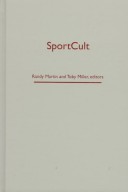Studies in Classical Philology
2 total works
Looking at such diverse examples of sport culture as aerobics, bodybuilding, Mexican pro-wrestling, golf-course design, the basketball documentary Hoop Dreams, women sportscasters, sports-related trademarks, martial arts in Tanzanian youth culture, and cricket in Sri Lanka and post-apartheid South Africa, SportCult deftly explores sport as a cultural frame of reference for such critical issues as national identity, the idea of the body, global capitalism, and the politics of representation.
Contributors: Rosemary J. Coombe, U of Toronto; Grant Farred, Williams College; Qadri Ismail, U of Minnesota; May Joseph, New York U; Bradley S. Klein, Clark U; Heather Levi; Jim McKay, U of Queensland, Australia; Gitanjali Maharaj; Michael R. Real, San Diego State U; Bruce Robbins, Rutgers U; David Rowe, U of Newcastle, Australia; Amanda Smith, Australian Broadcasting Corp; Jon Stratton, Curtin U of Technology, Australia.

